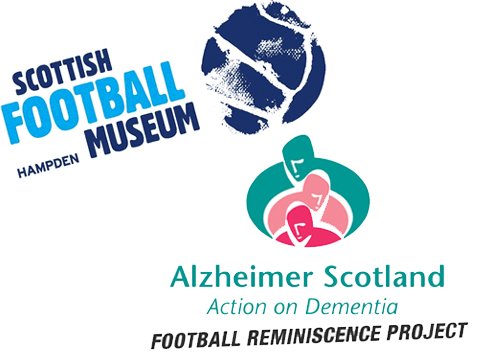Alzheimer Scotland and the Scottish Football Museum based within the National Stadium at Hampden Park have combined forces to issue a rallying call to football fans across Scotland. As part of their campaign, Fiona Hyslop, Culture Minister for Scotland, visited Hampden on Monday to officially open and to lend her support to the Quilt Display exhibits made by quilter Anne Hill that forms part of the Football Reminiscence Project that was mentioned in the SFL Newsletter on Christmas Eve.
 Museum Curator Richard McBrearty said: “The Museum will have been open for ten years this May and there will be a big celebration to mark that achievement.
Museum Curator Richard McBrearty said: “The Museum will have been open for ten years this May and there will be a big celebration to mark that achievement.
“However, the Football Reminiscence Project and Quilted Exhibitions are relatively new and it was something we never thought of when we opened.”
McBrearty continued: “The Football Reminiscence Project started four years ago with the support of Aberdeen, Falkirk and Hibernian and has really taken off in the past year.
“The next logical step is to move the project to a national level and both Alzheimer Scotland and the Museum are looking for volunteers to build on the success.”
The project is designed to support work carried out by Alzheimer Scotland and in its simplest terms, a volunteer would use images from the 1930s to the 1960s to build a rapport with a person who has dementia.
McBrearty added: “The aim of the Football Reminiscence Project is to supplement other work carried out by Alzheimer Scotland.
“We will supply images from our archives that will relate to a particular club, a player or a game to enable a conversation to take place. That conversation can perhaps unlock a memory that a person with dementia has and a conversation about how good the game was or how good a certain player was can take place.”
The Museum is not only supplying images as it is keen to welcome people with dementia to Hampden with McBrearty saying: “We have a new exhibit called ‘Football in the Fifties’ and this may prove really useful in generating memories.
 “It was a time of huge interest in football where domestic Leagues were very strong and the British Home International Championships were viewed as one of the best tournaments in the world.
“It was a time of huge interest in football where domestic Leagues were very strong and the British Home International Championships were viewed as one of the best tournaments in the world.
“As well as all this going on, the foundations for the modern game were being sown during that decade with Scotland entering the World Cup for the first time and Hibs being Scotland’s first team to enter the European Cup.
“We are hopeful that this type of exhibit will spark a memory when people with dementia visit our Museum.”
The Culture Minister’s visit was perfectly timed as plans for the roll out of the Reminiscence Project could be discussed.
McBrearty said: “The work since 2007 has been done on a small scale however, it has proven to be beneficial.
“I would like to think we helped get it off the ground but now is the right time for Alzheimer Scotland, who are the specialists in the field, to take it to another level with our assistance.
“They can operate on a much larger scale to help football to deliver memories nationally and we are delighted to have the role of being a very supportive partner.
“Alzheimer Scotland can build and run a small army of volunteers a lot better than a football museum can.
“We will supply digital images that will allow them to hold reminiscence discussions and we are hoping that hundreds of football fans can become part of this.”
McBrearty was asked about the attributes a volunteer would require and he advised: “The passion and knowledge of football fans is what is sought after. We are looking for fans that can interact with people with dementia to trigger a memory of an event based around football.
“It could be a game, a player, a song from the terracing, what would have been eaten before, during or after the game or even what transport was used to get fans to the game.”
No volunteer will be thrown in at the deep end with Alzheimer Scotland providing training and the role is very much a support one working with the person with dementia and their carers, whether that be family members, day carers or a care home.
McBrearty said: “We want fans to bring a ray of sunshine back into someone’s life. People with dementia can be isolated from what is going on around them and have nothing to stimulate them. That can lead to being removed from a social group and the project is looking for people to hold a conversation.
“A personal reminiscence is formed around a certain team from a certain era or a certain player. Starting the first conversation may not be easy until the correct image is found and a relationship is built from there.
“We are sure that once that reminiscence is personal, both parties will get a lot from the relationship. A person with dementia can turn around considerably through this interaction however, we know it is not a cure.
“These reminiscences, built around regular meetings, can take a person with dementia away from their condition for a period of time. With the volunteer’s help, they can be taken back to a time when they enjoyed football, enjoyed life and that can have a huge impact and it is a great gift to give someone.”
One of the main benefits hoped for in the Football Reminiscence Project is restoring links in families that may have been broken.
McBrearty commented: “It is really important for family members to see the benefit that greater interaction can bring.
“A grandfather could become more involved with his grandchildren because football has unlocked something and both of these generations have a common love of football to bind them.
“We have seen examples of that over the past few years and look forward to it being repeated on a wider scale.”
People from families which have experience with dementia are usually quick to volunteer with McBrearty saying: “In our experience, football fans will know someone who has dementia and family members often think that being involved in a project like this is a great way to honour someone they know that had dementia.
“Volunteers from the early stages of the project have come to us with this background and I am sure that many more will join in now.”
 A future development will see the football memories released by the project captured for future generations of Scots to benefit from.
A future development will see the football memories released by the project captured for future generations of Scots to benefit from.
McBrearty explained: “People with dementia tend to become isolated and lose a lot of interaction with family or people close to them. Capturing memories reverses that trend as we would be recording first hand accounts of what went on.
“There will be people in Scotland who were at the Real Madrid and Eintracht Frankfurt European Cup Final in 1960 at Hampden, who may now have dementia. We could capture their memories in a different manner from what was reported in the newspapers or what was contained in the match programme.
“They may not have seen these teams before the game, not even on television, and it would be great to hear how people viewed seeing those famous all white strips for the first time.
“It would be great to build an oral archive of memories like that for people to tap into for the next 50 years.”
There is another advantage in this potential development with McBrearty saying: “People with dementia can be one of the most excluded groups in society. Building an oral archive of their memories is a really positive development as it takes away some of the stigma of the condition and shows a contribution to the wider world.”
 The work in this area carried out by the Scottish Football Museum was not envisaged when it started a decade ago however, it shows how McBrearty and his team have grown the Museum.
The work in this area carried out by the Scottish Football Museum was not envisaged when it started a decade ago however, it shows how McBrearty and his team have grown the Museum.
He explained: “It was not an area we thought about when we were setting up the museum in 2000 or for the first few years but the seeds starting being sown in 2007.
“The contribution the Scottish Football Museum has made shows that we are not only a very good tourist attraction, we can make a valued contribution across society.
“We are delighted with the natural progression from the small project we were involved in four years ago to the much higher level project Alzheimer Scotland will be involved in going forward.”
McBrearty offered a final word of encouragement saying: “C’mon Scotland, let’s rise to the challenge.”
The Football Reminiscence Project will be around for years to come as the number of people with dementia is expected to double over the next 30 years from the present day figure of 70,000.
 Martin Rothero, Alzheimer Scotland’s Development Consultant for the Football Reminiscence Partnership, said: “What is critical to the success of the project is the establishment and development of strong partnerships.
Martin Rothero, Alzheimer Scotland’s Development Consultant for the Football Reminiscence Partnership, said: “What is critical to the success of the project is the establishment and development of strong partnerships.
“Key local partners in this early stage work include our local staff and services, local authorities, the residential care home sector, local football clubs and their historians/heritage groups, volunteer centres and local private enterprises.
“We want this project to make a big difference to the lives of people with dementia and their carers in their own communities.”
For further information and details of how you can help, please e-mail: [email protected].






.png)











